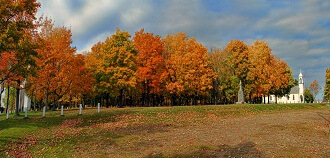Church of England Lays Claim to Minerals Under Private Land
Church of England Lays Claim to Minerals Under Private Land
 The Church of England has laid claim to minerals sitting underneath privately-owned land covering over half a million acres.
The Church of England has laid claim to minerals sitting underneath privately-owned land covering over half a million acres.
Ancient property laws, called “manorial” rights, allow the Church to claim rights over land it has previously owned and in 2013 a change in the law meant if mineral rights were not logged with HM Land Registry they could be lost.
The Church Commissioners have filed claims to ‘mineral rights’ in 5,773 places across the UK in the last eight years, according to Land Registry data. Reports note that since 2010 the Church has sent letters claiming ownership of the underground minerals to thousands of people currently living on the land.
Church has plans to profit from fracking
The ancient property laws provide the Church with the legal right to profit from the extraction of precious minerals and metals underground.
However, the Church has said that it has no plans to make money from fracking – although the Church’s investment bodies have recently released a report concluding that they perceived no Christian reason to object to the extraction of underground resources if it meant that local communities and the environment were not damaged in the process.
A spokesman for the Church Commissioners said:
“Our mineral rights registrations have no relation to fracking as all oil and gas deposits in the UK are owned by the Crown. There are absolutely no plans for us to exploit our land or mineral rights for that purpose.”
They added that the Church felt compelled to register existing rights “so that the Land Register will show who owns the surface and, where severed, who owns the minerals interest,” adding that they had no plans to claim any new rights in the future.
While the Church cannot profit directly from fracking because shale gas legally belongs to the monarchy, reports have indicated that the Church could receive compensation from fracking companies who profit from minerals taken from underneath the Churches’ land.
Is fracking a potential moral issue for the Church?
In 2013, the Diocese of Blackburn published a leaflet for its followers, stating that fracking presents “a choice between economic gain and a healthy environment.” The leaflet went on to argue that fracking could potentially threaten “God’s glorious creation.”
The Church leaflet also said that “Fracking causes a range of environmental problems” and urged followers of the faith to consider their Christian duty to behave as “stewards of the earth.”
The leaflet stated: “The time we spend thinking, praying and acting now to protect our drinking water, and the rest of God’s glorious Creation cannot compare with the time succeeding generations could potentially spend trying to make good what will likely happen if we in the church remain uninformed and silent.”
It also noted that the harms of fracking to the earth were not yet fully understood, highlighting that fracking was: “A relatively new technique to extract natural gas from previously unreachable depths is prompting a rush to drill, despite virtually no history as to its environmental impact.”
The Diocese of Blackburn wrote that the material wealth potentially promised from fracking “has lured landowners to sign or contemplate signing leases to drill on their land. This is one way they can retain their land and make money, and money in today’s world seems to count for more than environmental stability.”
MP says need for fracking has lessened
Conservative MP James Heappey has said the need to pursue fracking in Britain has lessened because of Government incentives to extract more oil and gas from the North Sea, and strong growth in renewable energy.
Theresa May’s general election manifesto promised to “develop the shale industry in Britain” – but there was no mention of the technology in the Autumn Budget.
Ministers are nevertheless next month expected to grant final consent for hydraulic fracturing at Kirby Misperton in North Yorkshire, which would be the first fracking project in the UK for six years.
Contact our residential development experts today
For more information or to discuss your requirements please call our experienced development lawyers on 01895 207803, or email us at housebuilders@ibblaw.co.uk.

